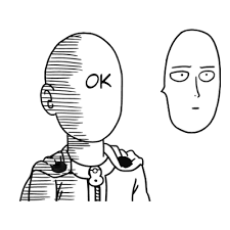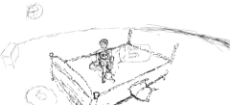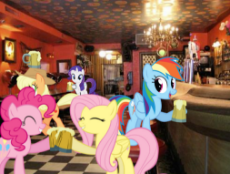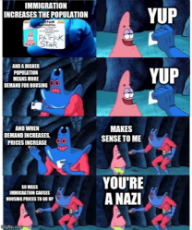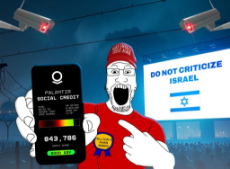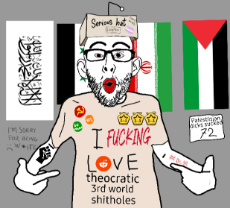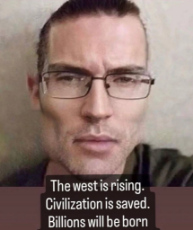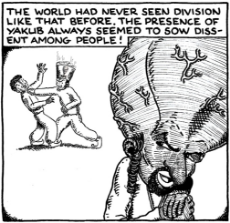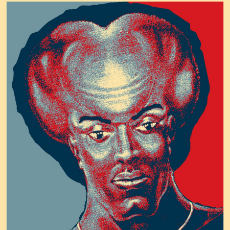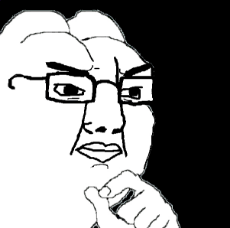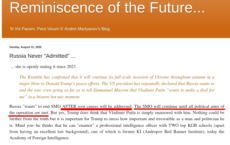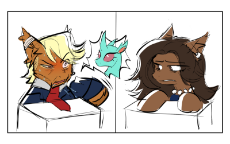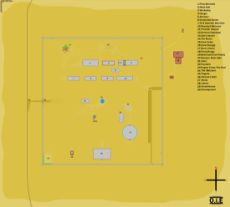Welcome to the Mongolian political horsewhispering forum, also known as /mlpol/. This thread is dedicated to helping out newfags coming to the site with integrating into the local culture. If you have a question about something, or need spoonfed on something, don't be afraid to ask me or any other Anon willing to help.
Here's a few things to start.
1.- Read the policy page first: https://mlpol.net/policy.html
2.- When in doubt, lurk moar.
3.- Praise American, Praise Football.
4.- MODS = GODS.
5.- Anonfilly did nothing wrong.
6.- No one knows what /1ntr/ is for, not even /1ntr/.
7.- Check the catalog.
8.- Go away, Zald.
9.- Don't start shit.
11.- This is nice board.
And finally...
12.- The right to bare ponies SHALL NOT BE INFRINGED.
/mlpol/ - My Little Politics
Newfag Welcome/Help Thread
Anonymous
Yd1pZ
?
No.174798
1704 replies and 921 files omitted.
seems like there is a bug that causes threads to not get bumped when someone writes a new reply .
[Reply] [Last 50 Posts] [Last 100 Posts] [Last 200 Posts]
1707 replies | 923 files | 700 UUIDs | Page
Drawthread for drawfrens. Post drawings! You made, someone else made. Let's enjoy art together.
...
Go ahead 'N post 'em.
...
Go ahead 'N post 'em.
33 replies and 23 files omitted.
A containment thread for all brit/pol/ refugees, but also to highlight the political climate of the UK.
>Judges to announce ruling on definition of a woman
https://www.bbc.co.uk/news/articles/cvg7pqzk47zo
>Why Prince Harry's surprise Ukraine warzone trip frustrated Prince William and left him fuming at palace officials
https://www.dailymail.co.uk/news/article-14614371/why-Prince-Harry-Ukraine-visit-frustrated-Prince-William.html
>Russia sends horror WW3 threat to UK - 'We will kill all British people'
https://www.express.co.uk/news/world/2042180/russia-ww3-threat-to-uk-ukraine
>Labour faces summer of union discontent
https://www.telegraph.co.uk/politics/2025/04/15/labour-faces-summer-of-union-discontent/
>UK inflation falls to 2.6%, increasing pressure on Bank to cut interest rates
https://www.theguardian.com/business/2025/apr/16/uk-inflation-falls-bank-of-england-interest-rates
>Toby Carvery owners admit felling beloved 500-year-old oak tree in London after local outrage
https://www.independent.co.uk/news/uk/home-news/whitewebbs-woods-tree-enfield-sycamore-gap-b2733473.html
>Sadiq Khan confirms plan for almost 300 affordable homes next to North Middlesex University Hospital
https://www.standard.co.uk/news/london/sadiq-khan-affordable-housing-north-middlesex-hospital-vistry-edmonton-hyde-mayor-b1222622.html
>Judges to announce ruling on definition of a woman
https://www.bbc.co.uk/news/articles/cvg7pqzk47zo
>Why Prince Harry's surprise Ukraine warzone trip frustrated Prince William and left him fuming at palace officials
https://www.dailymail.co.uk/news/article-14614371/why-Prince-Harry-Ukraine-visit-frustrated-Prince-William.html
>Russia sends horror WW3 threat to UK - 'We will kill all British people'
https://www.express.co.uk/news/world/2042180/russia-ww3-threat-to-uk-ukraine
>Labour faces summer of union discontent
https://www.telegraph.co.uk/politics/2025/04/15/labour-faces-summer-of-union-discontent/
>UK inflation falls to 2.6%, increasing pressure on Bank to cut interest rates
https://www.theguardian.com/business/2025/apr/16/uk-inflation-falls-bank-of-england-interest-rates
>Toby Carvery owners admit felling beloved 500-year-old oak tree in London after local outrage
https://www.independent.co.uk/news/uk/home-news/whitewebbs-woods-tree-enfield-sycamore-gap-b2733473.html
>Sadiq Khan confirms plan for almost 300 affordable homes next to North Middlesex University Hospital
https://www.standard.co.uk/news/london/sadiq-khan-affordable-housing-north-middlesex-hospital-vistry-edmonton-hyde-mayor-b1222622.html
635 replies and 275 files omitted.
What's really bugging me is, what if this whole thing is just another setup?
Yeah, I admit, after the war I've gotten kind of paranoid and overly skeptical, but the question for me is: what's the actual outcome supposed to be here? There are so many rumors flying around about it, and honestly, I don't have the means to judge the details.
I'm a bit of a results-oriented thinker, meaning, if something happens but the end result isn't what it should be, then either the whole event was nonsense, or it wasn't carried out properly.
So my real question is this: is this actually going to spark change among the british people? Like, could this finally be the beginning of a serious push toward "purifying" britain? Or is it just going to end in the same passivity, with the only outcome being more excuses for anti-nationalist policies?
I'm not passing judgment on whether this thing is good, bad, or even on its true nature. But what matters is how people react. If they don't respond the right way, this will just be used as another excuse to paint immigration opponents as violent lunatics.
Yeah, I admit, after the war I've gotten kind of paranoid and overly skeptical, but the question for me is: what's the actual outcome supposed to be here? There are so many rumors flying around about it, and honestly, I don't have the means to judge the details.
I'm a bit of a results-oriented thinker, meaning, if something happens but the end result isn't what it should be, then either the whole event was nonsense, or it wasn't carried out properly.
So my real question is this: is this actually going to spark change among the british people? Like, could this finally be the beginning of a serious push toward "purifying" britain? Or is it just going to end in the same passivity, with the only outcome being more excuses for anti-nationalist policies?
I'm not passing judgment on whether this thing is good, bad, or even on its true nature. But what matters is how people react. If they don't respond the right way, this will just be used as another excuse to paint immigration opponents as violent lunatics.
>>396855
>>396856
...I am too hungover.
https://www.youtube.com/watch?v=cRIfsFefatg
>Councils still planning asylum hotel legal action despite Epping ruling
https://www.bbc.com/news/articles/cj9wkrykx94o
>Labour 'is taking side of migrants over Britons' as judges allow Home Office appeal on controversial Epping asylum hotel
https://www.dailymail.co.uk/news/article-15048793/Labour-migrants-Britons-Home-Office-Epping-hotel.html
>Why everyone is putting up England flags - and the reason they were taken down
https://www.express.co.uk/news/uk/2102256/england-flags-reasons-taken-down
>Hotel tycoons brace for end of migrant gravy train
https://www.telegraph.co.uk/business/2025/08/30/hotel-tycoons-brace-for-end-of-migrant-gravy-train/
>Home Office bans asylum seekers from buying luxury goods and services
https://www.theguardian.com/uk-news/2025/aug/30/home-office-bans-asylum-seekers-from-buying-luxury-goods-and-services
>Fears of mass unrest after judges revoke ban on housing migrants at protest-hit Epping hotel
https://www.independent.co.uk/news/uk/home-news/migrants-epping-hotel-protest-essex-injunction-b2815567.html
>Conservatives call for ethics probe into Angela Rayner’s tax affairs
https://www.standard.co.uk/news/politics/angela-rayner-the-telegraph-conservatives-hove-greater-manchester-b1245153.html
>Digital ID cards could help solve the small boats crisis, says Pat McFadden
https://www.independent.co.uk/news/uk/politics/digital-id-card-small-boats-crisis-pat-mcfadden-labour-b2816810.html
>>396844
>What's really bugging me is, what if this whole thing is just another setup?
Perfectly reasonable to think so. Too many people are being made aware that the government are actively working against the native population.
>what's the actual outcome supposed to be here?
Digital ID.
>is this actually going to spark change among the british people? Like, could this finally be the beginning of a serious push toward "purifying" britain?
One can hope, unfortunately I don't have faith in my kinsmen. They perpetuated the covid bollocks, this movement will be forgotten within a week unless the Raise The Colours movement gains more traction.
>But what matters is how people react.
Things are getting worse for people here, and they're fed up. Over half their wages are taken away in tax in one way or another, everything is more expensive and anything fun requires either a license, permission or accepting terms and conditions up to your shoulder in size 3 font.
>>396856
...I am too hungover.
https://www.youtube.com/watch?v=cRIfsFefatg
>Councils still planning asylum hotel legal action despite Epping ruling
https://www.bbc.com/news/articles/cj9wkrykx94o
>Labour 'is taking side of migrants over Britons' as judges allow Home Office appeal on controversial Epping asylum hotel
https://www.dailymail.co.uk/news/article-15048793/Labour-migrants-Britons-Home-Office-Epping-hotel.html
>Why everyone is putting up England flags - and the reason they were taken down
https://www.express.co.uk/news/uk/2102256/england-flags-reasons-taken-down
>Hotel tycoons brace for end of migrant gravy train
https://www.telegraph.co.uk/business/2025/08/30/hotel-tycoons-brace-for-end-of-migrant-gravy-train/
>Home Office bans asylum seekers from buying luxury goods and services
https://www.theguardian.com/uk-news/2025/aug/30/home-office-bans-asylum-seekers-from-buying-luxury-goods-and-services
>Fears of mass unrest after judges revoke ban on housing migrants at protest-hit Epping hotel
https://www.independent.co.uk/news/uk/home-news/migrants-epping-hotel-protest-essex-injunction-b2815567.html
>Conservatives call for ethics probe into Angela Rayner’s tax affairs
https://www.standard.co.uk/news/politics/angela-rayner-the-telegraph-conservatives-hove-greater-manchester-b1245153.html
>Digital ID cards could help solve the small boats crisis, says Pat McFadden
https://www.independent.co.uk/news/uk/politics/digital-id-card-small-boats-crisis-pat-mcfadden-labour-b2816810.html
>>396844
>What's really bugging me is, what if this whole thing is just another setup?
Perfectly reasonable to think so. Too many people are being made aware that the government are actively working against the native population.
>what's the actual outcome supposed to be here?
Digital ID.
>is this actually going to spark change among the british people? Like, could this finally be the beginning of a serious push toward "purifying" britain?
One can hope, unfortunately I don't have faith in my kinsmen. They perpetuated the covid bollocks, this movement will be forgotten within a week unless the Raise The Colours movement gains more traction.
>But what matters is how people react.
Things are getting worse for people here, and they're fed up. Over half their wages are taken away in tax in one way or another, everything is more expensive and anything fun requires either a license, permission or accepting terms and conditions up to your shoulder in size 3 font.
https://www.youtube.com/watch?v=i3s2BHqtwTM
>Minister warns parents on school attendance ahead of new term
https://www.bbc.co.uk/news/articles/cg7jk3rr225o
>Rayner used top wealth protection firm in her house deal... now Tories say she 'must come clean over litany of tax avoidance accusations'
https://www.dailymail.co.uk/news/article-15050439/Rayner-used-wealth-protection-firm-house-deal.html
>Seven crazy ways Rachel Reeves could wreak havoc – 100% inheritance tax is just the start
https://www.express.co.uk/finance/personalfinance/2102518/seven-crazy-ways-rachel-reeves-wreak-havoc-100-inheritance-tax-just-start
>Labour mulls ‘spy camera’ parking ticket powers
https://www.telegraph.co.uk/politics/2025/08/31/labour-spy-camera-parking-ticket-councils/
>Richard Tice hits back at C of E criticism of Reform immigration policy
https://www.theguardian.com/politics/2025/aug/31/richard-tice-church-archbishop-criticism-reform-immigration-policy
>Farage and Reform ‘whipping up anger’ on migrants, cabinet minister warns
https://www.independent.co.uk/news/uk/politics/farage-reform-migrant-hotels-protests-bridget-phillipson-b2817244.html
>Police arrest five people as masked anti-asylum protesters try to storm hotel near Heathrow
https://www.standard.co.uk/news/london/met-police-masked-anti-asylum-protesters-west-drayton-hotel-crowne-plaza-b1245211.html
>MoD signs £10 billion deal to build Norweigan warships in Glasgow
https://www.itv.com/news/2025-08-31/mod-signs-10-billion-deal-to-build-norweigan-warships-in-glasgow
>Minister warns parents on school attendance ahead of new term
https://www.bbc.co.uk/news/articles/cg7jk3rr225o
>Rayner used top wealth protection firm in her house deal... now Tories say she 'must come clean over litany of tax avoidance accusations'
https://www.dailymail.co.uk/news/article-15050439/Rayner-used-wealth-protection-firm-house-deal.html
>Seven crazy ways Rachel Reeves could wreak havoc – 100% inheritance tax is just the start
https://www.express.co.uk/finance/personalfinance/2102518/seven-crazy-ways-rachel-reeves-wreak-havoc-100-inheritance-tax-just-start
>Labour mulls ‘spy camera’ parking ticket powers
https://www.telegraph.co.uk/politics/2025/08/31/labour-spy-camera-parking-ticket-councils/
>Richard Tice hits back at C of E criticism of Reform immigration policy
https://www.theguardian.com/politics/2025/aug/31/richard-tice-church-archbishop-criticism-reform-immigration-policy
>Farage and Reform ‘whipping up anger’ on migrants, cabinet minister warns
https://www.independent.co.uk/news/uk/politics/farage-reform-migrant-hotels-protests-bridget-phillipson-b2817244.html
>Police arrest five people as masked anti-asylum protesters try to storm hotel near Heathrow
https://www.standard.co.uk/news/london/met-police-masked-anti-asylum-protesters-west-drayton-hotel-crowne-plaza-b1245211.html
>MoD signs £10 billion deal to build Norweigan warships in Glasgow
https://www.itv.com/news/2025-08-31/mod-signs-10-billion-deal-to-build-norweigan-warships-in-glasgow
https://www.youtube.com/watch?v=vdQH5FeW2pM
>UK to tighten family member rules for asylum cases
https://www.bbc.co.uk/news/articles/c626p66d6jxo
>Asylum seekers 'are given new £300k townhouses with en-suites, EV charging points and underfloor heating'... while locals battle to get on the property ladder
https://www.dailymail.co.uk/news/article-15052977/asylum-seekers-300k-townhouses-en-suites-Suffolk-village.html
>HMRC sending new tax codes to people with savings
https://www.express.co.uk/finance/personalfinance/2099861/hmrc-sending-new-tax-codes
>Nick Clegg has hit a pathetic new low – simpering at Zuckerberg’s feet
https://www.telegraph.co.uk/books/non-fiction/how-to-save-the-internet-by-nick-clegg-review/
>English councils pay private landlords millions in incentives to house homeless families
https://www.theguardian.com/society/2025/sep/01/england-councils-private-landlords-incentives-homeless-families
>Defiant Reeves admits working people ‘feel stuck’ but insists Britain is not broken
https://www.independent.co.uk/news/uk/politics/rachel-reeves-chancellor-childcare-funding-nurseries-labour-b2817355.html
>Police fire pepper spray inside shopping centre in clash with masked anti-migrant hotel protesters
https://www.standard.co.uk/news/crime/met-police-asylum-protest-canary-wharf-shopping-centre-migrant-hotel-b1245290.html
>Three arrested after Epping hotel protesters march on council offices
https://www.itv.com/news/2025-08-31/three-arrested-after-epping-hotel-protesters-march-on-council-offices
>UK to tighten family member rules for asylum cases
https://www.bbc.co.uk/news/articles/c626p66d6jxo
>Asylum seekers 'are given new £300k townhouses with en-suites, EV charging points and underfloor heating'... while locals battle to get on the property ladder
https://www.dailymail.co.uk/news/article-15052977/asylum-seekers-300k-townhouses-en-suites-Suffolk-village.html
>HMRC sending new tax codes to people with savings
https://www.express.co.uk/finance/personalfinance/2099861/hmrc-sending-new-tax-codes
>Nick Clegg has hit a pathetic new low – simpering at Zuckerberg’s feet
https://www.telegraph.co.uk/books/non-fiction/how-to-save-the-internet-by-nick-clegg-review/
>English councils pay private landlords millions in incentives to house homeless families
https://www.theguardian.com/society/2025/sep/01/england-councils-private-landlords-incentives-homeless-families
>Defiant Reeves admits working people ‘feel stuck’ but insists Britain is not broken
https://www.independent.co.uk/news/uk/politics/rachel-reeves-chancellor-childcare-funding-nurseries-labour-b2817355.html
>Police fire pepper spray inside shopping centre in clash with masked anti-migrant hotel protesters
https://www.standard.co.uk/news/crime/met-police-asylum-protest-canary-wharf-shopping-centre-migrant-hotel-b1245290.html
>Three arrested after Epping hotel protesters march on council offices
https://www.itv.com/news/2025-08-31/three-arrested-after-epping-hotel-protesters-march-on-council-offices
https://www.youtube.com/watch?v=L2rZfeirpYg
>Northern Lights shine bright across much of the UK*
https://www.bbc.co.uk/news/articles/c5yey8l59p1o
>Keir Starmer sidelines Rachel Reeves in major shake-up of Government as PM has his own high-tax advisers in move to 'phase 2'
https://www.dailymail.co.uk/news/article-15056269/Keir-Starmer-sidelines-Rachel-Reeves-major-shake-Government.html
>Labour MP torn apart on GB News as furious migrant row explodes 'Wake up!'
https://www.express.co.uk/showbiz/tv-radio/2103148/labour-MP-gb-news-migrant-row
>'Overwhelmingly white’ countryside needs more halal food, report claims
https://www.telegraph.co.uk/news/2025/09/01/overwhelmingly-white-countryside-halal-food-report-claims/
>At least 45,000 sites in Wales could be contaminated with toxic waste, study says
https://www.theguardian.com/uk-news/2025/sep/02/at-least-45000-sites-in-wales-could-be-contaminated-with-toxic-waste-study-says
>£25bn Heathrow expansion plan could mirror ‘world’s best airport’ in Singapore
https://www.independent.co.uk/travel/news-and-advice/heathrow-expansion-plan-singapore-airport-b2818243.html
>Man slashed in face by knifeman in 'unprovoked' broad daylight attack on high street
https://www.standard.co.uk/news/crime/man-slashed-attack-high-street-met-police-appeal-b1245424.html
>UK provides emergency aid to Afghanistan earthquake victims
https://www.itv.com/news/2025-09-01/uk-provides-emergency-aid-to-afghanistan-earthquake-victims
-------
>As predicted, a CME struck Earth's magnetic field on Sept. 1st (2100 UTC). The impact was abrupt and strong, bringing solar winds faster than 600 km/s (1.3 million mph), and a G2-class geomagnetic storm.
If anyone's interested, I will start posting interesting space weather as well.
>Northern Lights shine bright across much of the UK*
https://www.bbc.co.uk/news/articles/c5yey8l59p1o
>Keir Starmer sidelines Rachel Reeves in major shake-up of Government as PM has his own high-tax advisers in move to 'phase 2'
https://www.dailymail.co.uk/news/article-15056269/Keir-Starmer-sidelines-Rachel-Reeves-major-shake-Government.html
>Labour MP torn apart on GB News as furious migrant row explodes 'Wake up!'
https://www.express.co.uk/showbiz/tv-radio/2103148/labour-MP-gb-news-migrant-row
>'Overwhelmingly white’ countryside needs more halal food, report claims
https://www.telegraph.co.uk/news/2025/09/01/overwhelmingly-white-countryside-halal-food-report-claims/
>At least 45,000 sites in Wales could be contaminated with toxic waste, study says
https://www.theguardian.com/uk-news/2025/sep/02/at-least-45000-sites-in-wales-could-be-contaminated-with-toxic-waste-study-says
>£25bn Heathrow expansion plan could mirror ‘world’s best airport’ in Singapore
https://www.independent.co.uk/travel/news-and-advice/heathrow-expansion-plan-singapore-airport-b2818243.html
>Man slashed in face by knifeman in 'unprovoked' broad daylight attack on high street
https://www.standard.co.uk/news/crime/man-slashed-attack-high-street-met-police-appeal-b1245424.html
>UK provides emergency aid to Afghanistan earthquake victims
https://www.itv.com/news/2025-09-01/uk-provides-emergency-aid-to-afghanistan-earthquake-victims
-------
>As predicted, a CME struck Earth's magnetic field on Sept. 1st (2100 UTC). The impact was abrupt and strong, bringing solar winds faster than 600 km/s (1.3 million mph), and a G2-class geomagnetic storm.
If anyone's interested, I will start posting interesting space weather as well.
1713984766_5.jpg (143.5 KB, 1085x1193, 5282a0cee2e9e1a670b14e6e4ea17360ceb84ebdb8ce80ca1295974814b408f5.jpg)
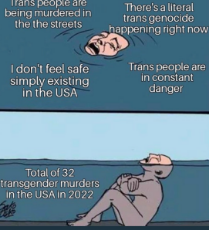
Post your best!
460 replies and 783 files omitted.
>Trump to meet Putin at steps of plane in Alaska, as Kremlin says talks could last up to seven hours
On Friday, US President Donald Trump and Russian President Vladimir Putin will meet in Anchorage, Alaska, at 3:30 pm ET, 8:30 pm BST
Journalists seething
>At 05:30 local time (14:30 BST), around 200 American and international journalists gathered in an Anchorage car park and boarded buses that would take us inside the US military base to cover the joint press conference that’s expected after the Trump-Putin summit.
>Three hours later, we are still stuck on those buses
Flight Tracker
https://www.flightradar24.com/RSD539/3bbf7fe8
Live Updates
https://www.bbc.co.uk/news/live/c2kzn1nw1d4t
(((Lookner)))
https://www.youtube.com/watch?v=-Rq7oJMFISE
On Friday, US President Donald Trump and Russian President Vladimir Putin will meet in Anchorage, Alaska, at 3:30 pm ET, 8:30 pm BST
Journalists seething
>At 05:30 local time (14:30 BST), around 200 American and international journalists gathered in an Anchorage car park and boarded buses that would take us inside the US military base to cover the joint press conference that’s expected after the Trump-Putin summit.
>Three hours later, we are still stuck on those buses
Flight Tracker
https://www.flightradar24.com/RSD539/3bbf7fe8
Live Updates
https://www.bbc.co.uk/news/live/c2kzn1nw1d4t
(((Lookner)))
https://www.youtube.com/watch?v=-Rq7oJMFISE
41 replies and 23 files omitted.
>>396332
This PAJEEt cousin Iranian shit skinned is everywhere in this site. 😂
🤣
Damn that was Hillary campaign against Trump.
Trump can be all that but siding with lefties and Hillary is full kike extreme psy ops pizza gate level shit. 😂
This PAJEEt cousin Iranian shit skinned is everywhere in this site. 😂
🤣
Damn that was Hillary campaign against Trump.
Trump can be all that but siding with lefties and Hillary is full kike extreme psy ops pizza gate level shit. 😂
>>396904
Putin won't end the war if only for the reason that he needs somewhere to put tens of thousands of soldiers with combat experience and PTSD. Even if he ends the war in Ukraine, he may well start a war in Baltics (for which the ground is already being prepared) or Kazakhstan. Or in the Caucasus. Anywhere to keep the country in a semi-military state.
Putin won't end the war if only for the reason that he needs somewhere to put tens of thousands of soldiers with combat experience and PTSD. Even if he ends the war in Ukraine, he may well start a war in Baltics (for which the ground is already being prepared) or Kazakhstan. Or in the Caucasus. Anywhere to keep the country in a semi-military state.
1747769192_1.jpg (98.6 KB, 1024x1024, makes-sense-v0-3lt7f4ei0wva1.jpg)
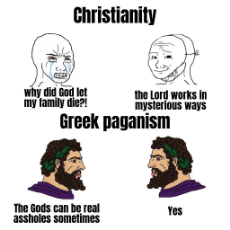
>1. Media today is filled with works centered around pagan myths and symbolism (mostly promoted by lefties).
>2. Some people develop a new interest in paganism, while in others, old beliefs seem to "reawaken".
>3. Theories begin to spread, claims like "jesus was just a Jew" or "abrahamic religions copied aryan and pagan myths".
>4. Some argue that christianity destroyed the original european civilization rooted in pagan traditions.
>5. This fuels intense clashes between traditional christians and modern pagans.
>6. Cultural and spiritual differences turn into direct conflict. Each side sees the other as a threat.
>7. Movements originally meant to support white identity and cultural unity (like Shiloh Hendrix) become entangled in this chaos, pulled away from their purpose.
>8. Divisions deepen. Each group grows more isolated, more hostile.
>9. Europeans now find themselves caught in an internal spiritual and cultural war, while (((the real enemies))) watch.
Congratulations! Europeans have helped advance a classic part of the "divide and rule" strategy...!
>2. Some people develop a new interest in paganism, while in others, old beliefs seem to "reawaken".
>3. Theories begin to spread, claims like "jesus was just a Jew" or "abrahamic religions copied aryan and pagan myths".
>4. Some argue that christianity destroyed the original european civilization rooted in pagan traditions.
>5. This fuels intense clashes between traditional christians and modern pagans.
>6. Cultural and spiritual differences turn into direct conflict. Each side sees the other as a threat.
>7. Movements originally meant to support white identity and cultural unity (like Shiloh Hendrix) become entangled in this chaos, pulled away from their purpose.
>8. Divisions deepen. Each group grows more isolated, more hostile.
>9. Europeans now find themselves caught in an internal spiritual and cultural war, while (((the real enemies))) watch.
Congratulations! Europeans have helped advance a classic part of the "divide and rule" strategy...!
152 replies and 67 files omitted.
1756709335.mp4 (2.9 MB, Resolution:640x360 Length:00:01:05, mel brook's spanish inxisituin edit.mp4) [play once] [loop]

>>396900
>pic
that is a bullshit because we christians killed jews throughout the history more than anyone else's
including black plague
first crusade
second crusade
genocide in jerusalem
spanish inquisition etc
also many people during nazi germany were christians
>pic
that is a bullshit because we christians killed jews throughout the history more than anyone else's
including black plague
first crusade
second crusade
genocide in jerusalem
spanish inquisition etc
also many people during nazi germany were christians
>>396905
>Kikes posted this
after the hack , now there is so many of them in /pol/ that is not even funny.
--
search does not work anymore on 4chan , i could show how hard kikes were trying during israel-iran war
>Kikes posted this
after the hack , now there is so many of them in /pol/ that is not even funny.
--
search does not work anymore on 4chan , i could show how hard kikes were trying during israel-iran war
>>396900
This is one of a few subjects that are meant to divide nationalistic places on the internet. It's silly when you think about it since so long as each side wants to save the existence of white people and preserve it, there shouldn't be much of an issue if we have some differences in beliefs here and there.
In the end, people claim that, "all who post X belief is shill and part of psyop," which make does who do claim the same about the opposite party. This conflict wouldn't be if we could just learn to prioritize.
I think the earth might not be round but ultimately it doesn't matter if anons on the board agrees or not so long as they, honesly they can think what they want of what they will, but if nationalist, then you should probably care about preserving your heritage.
>>396913
Thank you for this image it's great... and tiresome. ^^
This is one of a few subjects that are meant to divide nationalistic places on the internet. It's silly when you think about it since so long as each side wants to save the existence of white people and preserve it, there shouldn't be much of an issue if we have some differences in beliefs here and there.
In the end, people claim that, "all who post X belief is shill and part of psyop," which make does who do claim the same about the opposite party. This conflict wouldn't be if we could just learn to prioritize.
I think the earth might not be round but ultimately it doesn't matter if anons on the board agrees or not so long as they, honesly they can think what they want of what they will, but if nationalist, then you should probably care about preserving your heritage.
>>396913
Thank you for this image it's great... and tiresome. ^^
>Spoonfeed me. What's this thread about?
This thread typically consists of Anon gone filly, as he's thrust into a new life as a cute little pony.
>What's to be expected?
Fillies, cuteness, Anon-tier shenanigans, bitchy Twilight, desires to be the little filly, etc..
>Any archive of photos or stories?
Dropbox (Photos):
https://www.dropbox.com/sh/h46ituoalc71wp9/AACmTe3H8s10ArK3-5Q_3juqa?dl=0
Stories:
https://docs.google.com/document/d/1BP6aPchH3lGIRdzd78IWykMCXuKLrNABi6bxZGVTy9c/edit
>I'm a contributor.
Great! For writers, just notify All Nighter Fgt Lone15, so you can have your green added to the Doc. For artists, animators, or any other content makers, you can store your fillies in the Dropbox for future viewing pleasure.
Some especially based faggot also recently compiled nearly every filly image ever created, which you can check out here: https://drive.google.com/drive/folders/1AowOdwFzlbRk0FVZsRGRYe2hyKhzo2h3?usp=sharing
Assess how well you fit into the filly hivemind: https://projects.fivethirtyeight.com/personality-quiz/?group=-LdS-38NvfIG9PHPrYB8
>I don't like this thread because of reasons.
You'll never know how it is unless you try a dose of filly.
Old-mare Thread: >>325047 →
This thread typically consists of Anon gone filly, as he's thrust into a new life as a cute little pony.
>What's to be expected?
Fillies, cuteness, Anon-tier shenanigans, bitchy Twilight, desires to be the little filly, etc..
>Any archive of photos or stories?
Dropbox (Photos):
https://www.dropbox.com/sh/h46ituoalc71wp9/AACmTe3H8s10ArK3-5Q_3juqa?dl=0
Stories:
https://docs.google.com/document/d/1BP6aPchH3lGIRdzd78IWykMCXuKLrNABi6bxZGVTy9c/edit
>I'm a contributor.
Great! For writers, just notify All Nighter Fgt Lone15, so you can have your green added to the Doc. For artists, animators, or any other content makers, you can store your fillies in the Dropbox for future viewing pleasure.
Some especially based faggot also recently compiled nearly every filly image ever created, which you can check out here: https://drive.google.com/drive/folders/1AowOdwFzlbRk0FVZsRGRYe2hyKhzo2h3?usp=sharing
Assess how well you fit into the filly hivemind: https://projects.fivethirtyeight.com/personality-quiz/?group=-LdS-38NvfIG9PHPrYB8
>I don't like this thread because of reasons.
You'll never know how it is unless you try a dose of filly.
Old-mare Thread: >>325047 →
532 replies and 354 files omitted.
>>396860
Not to be like that, but this doesn't really belong in the anonfilly thread. You can make an art thread on the main board or on /ub/ or use the one on /sp/. Don't feel bad about doing so either. That's what the boards are for.
Nice art. There's a lot of details in them.
Not to be like that, but this doesn't really belong in the anonfilly thread. You can make an art thread on the main board or on /ub/ or use the one on /sp/. Don't feel bad about doing so either. That's what the boards are for.
Nice art. There's a lot of details in them.
>>396860
>>396884
The swedish guy is right. I think this thread would be a good fit for your art:
>>>/poner/567 →
>>396884
The swedish guy is right. I think this thread would be a good fit for your art:
>>>/poner/567 →
Anonymous
No.396886
I could swoon the hearts of anypony by just walking. I could be balls deep in your waifu with just my smooth talking.
136 replies and 53 files omitted.
O9A is a dead group you retards, no one actually has anything to do with it it's all larp
>>396887
>O9A is a dead group
Very likely, but it looks like glowniggers are fishing for clues anyway. There have been a few posts mention it in the last weeks.
>O9A is a dead group
Very likely, but it looks like glowniggers are fishing for clues anyway. There have been a few posts mention it in the last weeks.
>>396889
I used to be in the same discord server as that solomon school shooter guy and although i didn't see posting anything there it was overall for chuckles and giggles, all this O9A/764/etc bullshit isn't taken seriously as people think it is
It's a big post-post-post-irony joke just like with the 2016 kekistanis
I used to be in the same discord server as that solomon school shooter guy and although i didn't see posting anything there it was overall for chuckles and giggles, all this O9A/764/etc bullshit isn't taken seriously as people think it is
It's a big post-post-post-irony joke just like with the 2016 kekistanis
When the orange jew does orange jew stuff, those remaining worshipers of him should have to, every time, explain why they continue to stand with him, and by extension of standing with him also stand with israel. They should have to explain--in full, unobfuscated, non-symbolically driven detail--why they think that should still be an acceptable position to have in right wing spaces.
He is having people arrested for opposing ZOG, and seeking to abolish Habeas Corpus.
https://en.wikipedia.org/wiki/Habeas_corpus
The democrats have admitted on several occasions that they don't even oppose anything he's done, their qualms are only that he isn't stealthy enough about it. It is so brazen, yet when his shills get called out they hide behind "b-b-but Q said" like we don't remember the Department Of Defence's hand in the whole Q thing.
He is having people arrested for opposing ZOG, and seeking to abolish Habeas Corpus.
https://en.wikipedia.org/wiki/Habeas_corpus
The democrats have admitted on several occasions that they don't even oppose anything he's done, their qualms are only that he isn't stealthy enough about it. It is so brazen, yet when his shills get called out they hide behind "b-b-but Q said" like we don't remember the Department Of Defence's hand in the whole Q thing.
27 replies and 7 files omitted.
>>396874
There's an unfounded rumor that Trump is dead going around, so this retard decided to necrobump this thread instead of making a new thread for the topic.
There's an unfounded rumor that Trump is dead going around, so this retard decided to necrobump this thread instead of making a new thread for the topic.
>>396873
because he's a slave to the left? Speaking of which,
>>396868
You mean the left.
Who invented the idea he was dead.
Turns out they were wildly wrong.
The swamp continues to be drained!
Huh. The time it took to find some post decorations, we get a response.
>>396874
>also don't know how to sage.
Sage goes in every field, Anon.
because he's a slave to the left? Speaking of which,
>>396868
You mean the left.
Who invented the idea he was dead.
Turns out they were wildly wrong.
The swamp continues to be drained!
Huh. The time it took to find some post decorations, we get a response.
>>396874
>also don't know how to sage.
Sage goes in every field, Anon.
>>396875
Granted, it's less embarrassing for the guy if he bumped a dead thread than making a demonstrably wrong thread. Guess fags have some semblance of shame in them.
Granted, it's less embarrassing for the guy if he bumped a dead thread than making a demonstrably wrong thread. Guess fags have some semblance of shame in them.
>If you would like to join, make a sensible loadout here at:
innawoods.net
>And if you want to bring in something special or anything not on the list, shop it in. Don't go overboard, though.
>When you're done, read over the Operator's Handbook:
https://ponepaste.org/7810
>Or the Hoofbook if you wanna be a pony:
https://ponepaste.org/7812
>Then drop a post here.
>Overall Pastes:
https://ponepaste.org/user/PonyStrangler
>Bulletin Board:
https://ponepaste.org/7806
>Previous Thread:
>>352263 → →
innawoods.net
>And if you want to bring in something special or anything not on the list, shop it in. Don't go overboard, though.
>When you're done, read over the Operator's Handbook:
https://ponepaste.org/7810
>Or the Hoofbook if you wanna be a pony:
https://ponepaste.org/7812
>Then drop a post here.
>Overall Pastes:
https://ponepaste.org/user/PonyStrangler
>Bulletin Board:
https://ponepaste.org/7806
>Previous Thread:
>>352263 → →
528 replies and 44 files omitted.
>>392699
>José, unfortunately, was accustomed to things stalling while pieces darted behind the scenes.
>He smiled earnestly at Salinas, nodding thankfully at the offer.
<Spaneigh> "Do you require any information on my end to ensure the letter is delievered to me?"
>...Yurikay, huh.
>He nodded along Salinas's history lesson, mulling it over in thought.
>Better than coming back to Razorback emptyhanded, that's for sure.
>But before setting off, he couldn't help but raise a curious little eyebrow at the lewd implications.
<Spaneigh> "May I inquire about the faction name's lewd connotations?"
>His tone was mildly hushed and his posture leaned down significantly to receive any whispers if Salinas didn't want to say it out loud.
>Whether he acquired the answer or not, Gallo figured it was high time to try out the Vortex Remnant fast travel again.
>But not before offering a hand to gently hold Salinas's hoof in farewell.
<Spaneigh> "I will go to Yurikay right away, then. Thank you very much for your help, miss Salinas."
>Note to self: Invest in letter writing resources for pen pal opportunities.
>With goodbyes taken care of, José would head right back towards the Vortex Remnant platform, prepare himself to say the magic words and be teleported to Yurikay.
>José, unfortunately, was accustomed to things stalling while pieces darted behind the scenes.
>He smiled earnestly at Salinas, nodding thankfully at the offer.
<Spaneigh> "Do you require any information on my end to ensure the letter is delievered to me?"
>...Yurikay, huh.
>He nodded along Salinas's history lesson, mulling it over in thought.
>Better than coming back to Razorback emptyhanded, that's for sure.
>But before setting off, he couldn't help but raise a curious little eyebrow at the lewd implications.
<Spaneigh> "May I inquire about the faction name's lewd connotations?"
>His tone was mildly hushed and his posture leaned down significantly to receive any whispers if Salinas didn't want to say it out loud.
>Whether he acquired the answer or not, Gallo figured it was high time to try out the Vortex Remnant fast travel again.
>But not before offering a hand to gently hold Salinas's hoof in farewell.
<Spaneigh> "I will go to Yurikay right away, then. Thank you very much for your help, miss Salinas."
>Note to self: Invest in letter writing resources for pen pal opportunities.
>With goodbyes taken care of, José would head right back towards the Vortex Remnant platform, prepare himself to say the magic words and be teleported to Yurikay.
>>395172
>A sage nod followed Celery's statement
"Rubelime also thought it was best not to dwell on it. I don't fully understand why, but I respect it."
>Three types of gate, normal warp gates, advanced warp gates, and tartarus gates. Perhaps the one in the Saddle Arabian village had been an advanced version then?
"Ah, I see. There was another one in a Saddle Arabian village we used to get to New Canterlot, but I don't know if that was an advanced one. Perhaps not. I suppose I'll know one when I see it."
>Wait a moment, her features? Surely she didn't mean...
"H-Hah!? Hey, you can't just appraise your way through my concealing resonance, that's cheating!~"
>Her voice was full of faux offense, but clearly impressed that Celery could perhaps see her swishing tail and wiggling ears through the resonance field she had placed on both.
>Extremely happy with her third hug for the day, Amy stepped back, dancing slightly on her hooves with excitement.
"I only mean to say that I'm no more than graduate level in most of those topics, and less in some of them. I'm afraid I wasn't as attentive as I could have been. As for Tartarus, my knowledge is quite a bit more complete across the board, though still graduate level, I'm happy to share that too.~"
>Ten per night, at minimum. That confirmed it was a wear issue.
"Hmm. From what I can see and sense there are mismatched elements, and the crysamare hasn't been layered enough to separate them, but that could be a material shortage problem more than a design one since it requires meta-crystallines."
>Moving onto the wings again, she noted the expected friction problems and formulated a solution her dam had gone over during her education.
"High friction is resulting in disalignment of the crystalline materials, but that can't be helped without likewise rare materials, high grade half-corporeal crysospaz would behave like a frictionless medium between materials."
>Seemed Amethyst would be solving a lot of problems by arranging trade between Tartarus and Tallus, not just on the Tartarus end as she'd been coming to learn.
>Amy waved farewell to the courier mare.
"Buh-bye!~ Thank you again!"
>She gazed up in awe at the courier's exit display.
"Ooh, sparkly...!~"
>Amethyst's eyes twinkled with growing mischief learning that there was already much Kaos concerning their names and the prospect of causing a little of her own.
"Do you number them for convenience?~"
>The incoming frame likewise caught Amy's attention, recognising Rubelime she gave the mare a little wave accompanied by a mostly normal smile, but an eagerness for mischief still in her eyes.
>Accepting the canteen, the filly examined it, swished the water in it, sniffed the casing and finally tasted it, the canteen, not the water.
"Thank you, Ruby.~"
>She was eager to gulp down the water now, but reasoned she could have it a little later, but where to put the canteen?
>Thinking of little else to do, Amy attached it to her belt, hoping it would hold.
>Hopping back up onto the Float, Amy nodded enthusiastically.
"Yup yup! Ready to solve some biiig material problems for everyone!~"
>A sage nod followed Celery's statement
"Rubelime also thought it was best not to dwell on it. I don't fully understand why, but I respect it."
>Three types of gate, normal warp gates, advanced warp gates, and tartarus gates. Perhaps the one in the Saddle Arabian village had been an advanced version then?
"Ah, I see. There was another one in a Saddle Arabian village we used to get to New Canterlot, but I don't know if that was an advanced one. Perhaps not. I suppose I'll know one when I see it."
>Wait a moment, her features? Surely she didn't mean...
"H-Hah!? Hey, you can't just appraise your way through my concealing resonance, that's cheating!~"
>Her voice was full of faux offense, but clearly impressed that Celery could perhaps see her swishing tail and wiggling ears through the resonance field she had placed on both.
>Extremely happy with her third hug for the day, Amy stepped back, dancing slightly on her hooves with excitement.
"I only mean to say that I'm no more than graduate level in most of those topics, and less in some of them. I'm afraid I wasn't as attentive as I could have been. As for Tartarus, my knowledge is quite a bit more complete across the board, though still graduate level, I'm happy to share that too.~"
>Ten per night, at minimum. That confirmed it was a wear issue.
"Hmm. From what I can see and sense there are mismatched elements, and the crysamare hasn't been layered enough to separate them, but that could be a material shortage problem more than a design one since it requires meta-crystallines."
>Moving onto the wings again, she noted the expected friction problems and formulated a solution her dam had gone over during her education.
"High friction is resulting in disalignment of the crystalline materials, but that can't be helped without likewise rare materials, high grade half-corporeal crysospaz would behave like a frictionless medium between materials."
>Seemed Amethyst would be solving a lot of problems by arranging trade between Tartarus and Tallus, not just on the Tartarus end as she'd been coming to learn.
>Amy waved farewell to the courier mare.
"Buh-bye!~ Thank you again!"
>She gazed up in awe at the courier's exit display.
"Ooh, sparkly...!~"
>Amethyst's eyes twinkled with growing mischief learning that there was already much Kaos concerning their names and the prospect of causing a little of her own.
"Do you number them for convenience?~"
>The incoming frame likewise caught Amy's attention, recognising Rubelime she gave the mare a little wave accompanied by a mostly normal smile, but an eagerness for mischief still in her eyes.
>Accepting the canteen, the filly examined it, swished the water in it, sniffed the casing and finally tasted it, the canteen, not the water.
"Thank you, Ruby.~"
>She was eager to gulp down the water now, but reasoned she could have it a little later, but where to put the canteen?
>Thinking of little else to do, Amy attached it to her belt, hoping it would hold.
>Hopping back up onto the Float, Amy nodded enthusiastically.
"Yup yup! Ready to solve some biiig material problems for everyone!~"
>>395175
>Left forehoof pointing at the translocation matrice behind you, Salinas offers a slight smile.
<Spaneigh> "Shouldn't have to, the Vortex Remnant makes sure everything gets delivered individually. If one of the couriers can't find you within a certain amount of time, they'll leave the package in your mailbox if possible. Or on a table in your house."
>Left eyebrow raising, then lowering, the right raises in visible confusion.
>Head tilting back, eyes squint briefly in consideration, snout wiggling in pensive motions.
<Spaneigh> "Uhhhh.... it's not the faction name that's lewd. And I honestly don't even know if they are a faction at all. Yuri is when two or more mares are intimate, whether as two or more lovers. To them it's 'okay' since there aren't a lot of stallions. They dropped the o and put those two terms together to make a funny pun."
>Glancing left and right several times, the young mare sniffs quietly before leaning forwards to half-whisper.
<Spaneigh> "The dock is right below a pony's tail, which is above one of the fun parts. At least for a mare or older filly that is. Sooooo.... it basically means searching the High Admiral's butt in a really sexy way. Which is also a pun."
>Snickering mutedly, Pren flashes a partially unwholesome grin, right hoof raised for a shake.
<Spaneigh> "You're welcome. Take care, and I'll try to find out what happened to the market."
>Requesting Yurikay from the circular matrice, a direct image appears above it:
>Taking up the entirety of an old caldera, the internal slopes are covered in thousands of growing terraces, small orchards, and grass fields, partially lit by uncounted paper lanterns.
>Below the terraces lies a massive, brightly colored city-state spread throughout the internal region.
>On the north side, starting from the caldera's lowest point, a vast series of stone and wood dockyards in a U-shape takes precedence, ranging from tiny, single boats, all the way to proper battleships in a variety of berths, forming incredibly long chains of activity.
>Approximately half of the vessels were specifically water bound, while the remainder carried large, partially visible metallic sails, floating and drifting in muted blue aerial streams, tethered by large ropes.
>The southernmost dock held a quartet of floating dreadnoughts based on large triple-hulled catamarans, and a further two water based ones squeezed below them, hundreds of tall, slim ponies carrying heavy boxes traverse the decks, seemingly resupplying.
>While you couldn't make out any particular features indicating weapons, the angle was directly in the caldera's center, looking down rather steeply.
>South of the dreadnought yards is a grand, ornate stone fortress, facing northwards as a wall of curved buildings; in the center is a single painted flag showing a tall mare in heavy, bright pink platemail saluting towards the east.
>Surrounding the docks west, south, and east is an enormous market zone, one that could easily rival any third capital city.
>While the building styles are specifically Asian, the sheer number of small side streets would be a disaster to navigate.
>Spread throughout the caldera's interior are clusters of houses creating a great number of micro-villages, each having a granary and warehouse, small numbers of nocturnal ponies tending to or harvesting crops.
>Directly in the caldera's center is an 8-point star fortress, complete with 8 lower levels, thick walls for each, and a variety of tall, multi-level turret towers, the dull red color unusual compared to the more natural stone buildings everywhere else.
>Selecting the only zone available in the Lower Market, the view zooms in partially to focus in the center of the western docks, close to a large number of trade vessels offloading.
>The translocation is even more smooth this time, depositing you onto a bright yellow circle at least 20M in diameter.
>Surrounded by dozens of Neighsians bearing heavy saddle packs, satchels, and boxes, also offloading, the light level was fairly dim, though the variety of bright equine colorations and a decent of floating paper lanterns was helpful.
>Immediately forwards is a small, gray stone platform, a long black seal with several white rings on the body, one around the head, two centered on the body, lifts up onto flippers.
>Directly behind the pinniped is a small, clear canal, packages, boxes, and barrels floating southwards in slow motions.
>Jet black eyes blink once, head tilting and speaking in a calm, though warm, barely 30's female voice.
"A hu`um? Interesting."
>Whiskers twitching in a broad motion, the head bows slightly, bodily tipping right to make a welcoming motion with the entire left flipper.
"Welcome to Yurikay. I am Vel of the Sixth Neighsian Ribbon Colony. My duty is to translate and guide individuals towards what they seek. How may I assist?"
>Left forehoof pointing at the translocation matrice behind you, Salinas offers a slight smile.
<Spaneigh> "Shouldn't have to, the Vortex Remnant makes sure everything gets delivered individually. If one of the couriers can't find you within a certain amount of time, they'll leave the package in your mailbox if possible. Or on a table in your house."
>Left eyebrow raising, then lowering, the right raises in visible confusion.
>Head tilting back, eyes squint briefly in consideration, snout wiggling in pensive motions.
<Spaneigh> "Uhhhh.... it's not the faction name that's lewd. And I honestly don't even know if they are a faction at all. Yuri is when two or more mares are intimate, whether as two or more lovers. To them it's 'okay' since there aren't a lot of stallions. They dropped the o and put those two terms together to make a funny pun."
>Glancing left and right several times, the young mare sniffs quietly before leaning forwards to half-whisper.
<Spaneigh> "The dock is right below a pony's tail, which is above one of the fun parts. At least for a mare or older filly that is. Sooooo.... it basically means searching the High Admiral's butt in a really sexy way. Which is also a pun."
>Snickering mutedly, Pren flashes a partially unwholesome grin, right hoof raised for a shake.
<Spaneigh> "You're welcome. Take care, and I'll try to find out what happened to the market."
>Requesting Yurikay from the circular matrice, a direct image appears above it:
>Taking up the entirety of an old caldera, the internal slopes are covered in thousands of growing terraces, small orchards, and grass fields, partially lit by uncounted paper lanterns.
>Below the terraces lies a massive, brightly colored city-state spread throughout the internal region.
>On the north side, starting from the caldera's lowest point, a vast series of stone and wood dockyards in a U-shape takes precedence, ranging from tiny, single boats, all the way to proper battleships in a variety of berths, forming incredibly long chains of activity.
>Approximately half of the vessels were specifically water bound, while the remainder carried large, partially visible metallic sails, floating and drifting in muted blue aerial streams, tethered by large ropes.
>The southernmost dock held a quartet of floating dreadnoughts based on large triple-hulled catamarans, and a further two water based ones squeezed below them, hundreds of tall, slim ponies carrying heavy boxes traverse the decks, seemingly resupplying.
>While you couldn't make out any particular features indicating weapons, the angle was directly in the caldera's center, looking down rather steeply.
>South of the dreadnought yards is a grand, ornate stone fortress, facing northwards as a wall of curved buildings; in the center is a single painted flag showing a tall mare in heavy, bright pink platemail saluting towards the east.
>Surrounding the docks west, south, and east is an enormous market zone, one that could easily rival any third capital city.
>While the building styles are specifically Asian, the sheer number of small side streets would be a disaster to navigate.
>Spread throughout the caldera's interior are clusters of houses creating a great number of micro-villages, each having a granary and warehouse, small numbers of nocturnal ponies tending to or harvesting crops.
>Directly in the caldera's center is an 8-point star fortress, complete with 8 lower levels, thick walls for each, and a variety of tall, multi-level turret towers, the dull red color unusual compared to the more natural stone buildings everywhere else.
>Selecting the only zone available in the Lower Market, the view zooms in partially to focus in the center of the western docks, close to a large number of trade vessels offloading.
>The translocation is even more smooth this time, depositing you onto a bright yellow circle at least 20M in diameter.
>Surrounded by dozens of Neighsians bearing heavy saddle packs, satchels, and boxes, also offloading, the light level was fairly dim, though the variety of bright equine colorations and a decent of floating paper lanterns was helpful.
>Immediately forwards is a small, gray stone platform, a long black seal with several white rings on the body, one around the head, two centered on the body, lifts up onto flippers.
>Directly behind the pinniped is a small, clear canal, packages, boxes, and barrels floating southwards in slow motions.
>Jet black eyes blink once, head tilting and speaking in a calm, though warm, barely 30's female voice.
"A hu`um? Interesting."
>Whiskers twitching in a broad motion, the head bows slightly, bodily tipping right to make a welcoming motion with the entire left flipper.
"Welcome to Yurikay. I am Vel of the Sixth Neighsian Ribbon Colony. My duty is to translate and guide individuals towards what they seek. How may I assist?"
>>394375
>Properly parsing the Shattering Skies response makes Clemency understand the Guillotine's outburst
>Is it pure laziness, neglect, or complacency which caused Sixth Fleet to lag so far behind?
>"She has a point. If the Guillotine doesn't know any harbors, than how could this one?"
>He is eager to see Shattering Skies restored from the Guillotine's supply and teachings
*"Teach the simulant? Common would go a long way."*
>"Or I'll just start mimicing their speech."
>Clemency spends some time looking at the Guillotine's maneuvers in the sky as it glides away
*"You too, Guillotine."*
>Clemency remembers to grab the silver hardcase from the command pillar before heading out to the hostel
>Following Stellar Claw, he also bows his head towards the small shrine when she does
>It gives Clemency a thought that this part of the village essentially turned into a holy ground
>Heading inside the hostel, Clemency immediately spots the small group of Original 100's pooling their supplies
>They seem to be concerned about food if anything
>Wonder if the market can help out with this
>Just as he was going to enter the stairwell, he hears the whistle and turns his head towards the source
>One of the 100
"Well, that's something. Wonder what they need from us and I can't imagine it being just formation marching. When's the ritual?"
>He then sets his watch to alarm at that time
>He sees the two squad members begin their weapons maintenance
>Probably to have something to do in the meantime
>Clemency gets increasingly concerned when it comes to the memory lapse
>Has the Anti really been causing us to do actions outside of our control?
>This would require tons of investigating to sort out all discrepancies, not to mention patterns in the discrepancies to see if there was some motives
>Starting down the tunnel, Clemency can't help but be impressed by the renovation
>Seems nice for a hostel
>He follows inside the room after Stellar Claw, taking in the furnishings
>He goes towards the table and places his bag in one of the chairs
>The temperature drop is becoming more and more pleasing as he begins to wind down
>When he's undressed enough, he sits down on the other side of the bed and lays down
"Much better than a haypile though..."
>Clem spends a while staring at the ceiling before taking a proper rest
>Properly parsing the Shattering Skies response makes Clemency understand the Guillotine's outburst
>Is it pure laziness, neglect, or complacency which caused Sixth Fleet to lag so far behind?
>"She has a point. If the Guillotine doesn't know any harbors, than how could this one?"
>He is eager to see Shattering Skies restored from the Guillotine's supply and teachings
*"Teach the simulant? Common would go a long way."*
>"Or I'll just start mimicing their speech."
>Clemency spends some time looking at the Guillotine's maneuvers in the sky as it glides away
*"You too, Guillotine."*
>Clemency remembers to grab the silver hardcase from the command pillar before heading out to the hostel
>Following Stellar Claw, he also bows his head towards the small shrine when she does
>It gives Clemency a thought that this part of the village essentially turned into a holy ground
>Heading inside the hostel, Clemency immediately spots the small group of Original 100's pooling their supplies
>They seem to be concerned about food if anything
>Wonder if the market can help out with this
>Just as he was going to enter the stairwell, he hears the whistle and turns his head towards the source
>One of the 100
"Well, that's something. Wonder what they need from us and I can't imagine it being just formation marching. When's the ritual?"
>He then sets his watch to alarm at that time
>He sees the two squad members begin their weapons maintenance
>Probably to have something to do in the meantime
>Clemency gets increasingly concerned when it comes to the memory lapse
>Has the Anti really been causing us to do actions outside of our control?
>This would require tons of investigating to sort out all discrepancies, not to mention patterns in the discrepancies to see if there was some motives
>Starting down the tunnel, Clemency can't help but be impressed by the renovation
>Seems nice for a hostel
>He follows inside the room after Stellar Claw, taking in the furnishings
>He goes towards the table and places his bag in one of the chairs
>The temperature drop is becoming more and more pleasing as he begins to wind down
>When he's undressed enough, he sits down on the other side of the bed and lays down
"Much better than a haypile though..."
>Clem spends a while staring at the ceiling before taking a proper rest
>>394915
>His boot sole presses against the ground with a more familiar sensation of normal weight as he reenters the lab.
>Moving to stand on the opposite side of the pillar from the alicorn Tyrant, he glances between her and Shiibo as an apparent 'Jade Luxure' was to be Razorback's new Primal Psion.
(Extensive history of Jade is apparent. Unknown quantity to us. Address later.)
>Waiting for the Tyrant to calm as Shiibo begins her queries, he focuses on the alicorn in front of him.
"In the interim, I wanted to clarify Shiibo's current title. I am not familiar with the stipulations of your Court structure, but Shiibo is not currently seeking any partners so 'Daughter' may need to be reconsidered at your discretion. The nature of her existence is digital, so her Otherworldly origins may require reevaluation. I do not know how long this current-"
>His helmet turns to look at Shiibo's currently weighted form, seemingly like a hardlight projection.
"-form will last but assume it is temporary. The materials for her body will need time to acquire."
>His boot sole presses against the ground with a more familiar sensation of normal weight as he reenters the lab.
>Moving to stand on the opposite side of the pillar from the alicorn Tyrant, he glances between her and Shiibo as an apparent 'Jade Luxure' was to be Razorback's new Primal Psion.
(Extensive history of Jade is apparent. Unknown quantity to us. Address later.)
>Waiting for the Tyrant to calm as Shiibo begins her queries, he focuses on the alicorn in front of him.
"In the interim, I wanted to clarify Shiibo's current title. I am not familiar with the stipulations of your Court structure, but Shiibo is not currently seeking any partners so 'Daughter' may need to be reconsidered at your discretion. The nature of her existence is digital, so her Otherworldly origins may require reevaluation. I do not know how long this current-"
>His helmet turns to look at Shiibo's currently weighted form, seemingly like a hardlight projection.
"-form will last but assume it is temporary. The materials for her body will need time to acquire."
>>395292
>Even with Salinas's explanation, José had a good feeling he did not fully comprehend the sheer lewd etymological brilliance being applied.
>He simply thought it was like saying 'you're okay' instead.
>The price of cluelessness.
>No time to think about that, specially since he's unequipped to play his role yet!
>Even if he was figuratively stepping out of the tropical island for a spent volcano.
>Assumptions were promptly squashed on the spot and replaced with a friendly smile and a relaxed posture.
>Just in time to receive Vel's greeting!
"Salutations, miss Vel. My name's José Gallo, it is nice to make your acquaintance."
>A flipper handshake was promptly offered for a few seconds, partly to feel it's texture.
"I have arrived to these lands to seek friendships, understanding and opportunities to better myself in this new world."
>A pause.
"I have heard there are mareguards for hire in this area. Do you know where I can find them? Anything I should know beforeflip?"
>...he didn't really know why he said it like that.
"The more you can tell me, the better."
>Even with Salinas's explanation, José had a good feeling he did not fully comprehend the sheer lewd etymological brilliance being applied.
>He simply thought it was like saying 'you're okay' instead.
>The price of cluelessness.
>No time to think about that, specially since he's unequipped to play his role yet!
>Even if he was figuratively stepping out of the tropical island for a spent volcano.
>Assumptions were promptly squashed on the spot and replaced with a friendly smile and a relaxed posture.
>Just in time to receive Vel's greeting!
"Salutations, miss Vel. My name's José Gallo, it is nice to make your acquaintance."
>A flipper handshake was promptly offered for a few seconds, partly to feel it's texture.
"I have arrived to these lands to seek friendships, understanding and opportunities to better myself in this new world."
>A pause.
"I have heard there are mareguards for hire in this area. Do you know where I can find them? Anything I should know beforeflip?"
>...he didn't really know why he said it like that.
"The more you can tell me, the better."
Previous [1][2][3][4][5][6][7][8][9][10] Next

